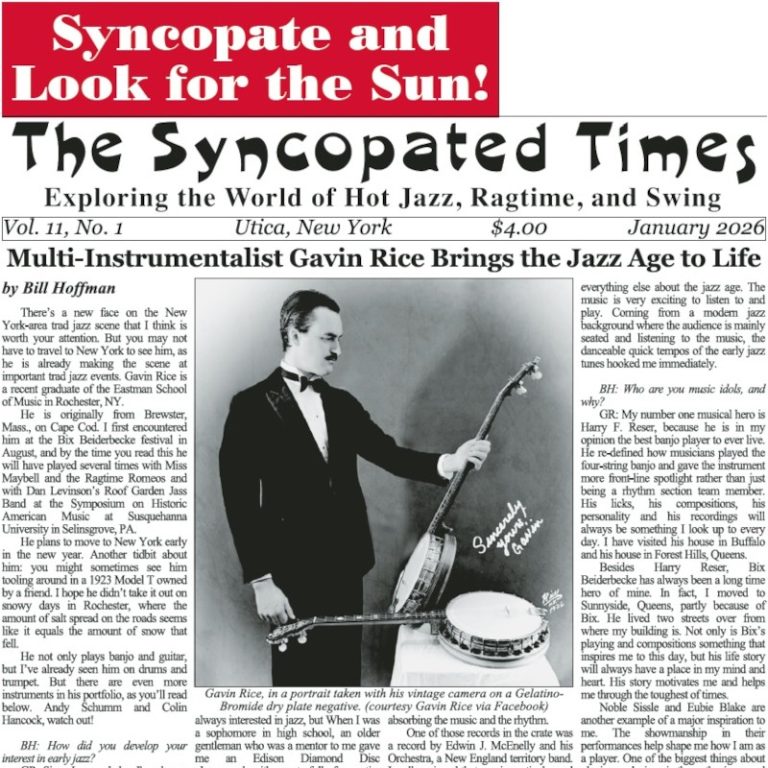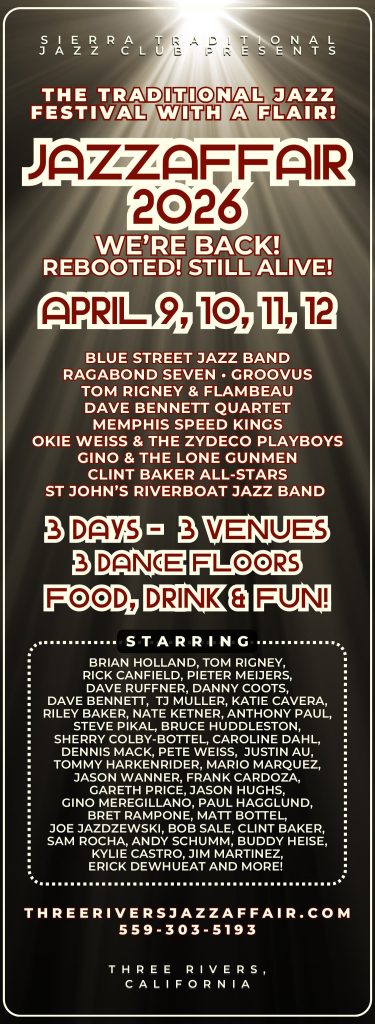A Tribute to Oscar “Papa” Celestin and Other Early Jazz Artists from the Thibodaux, La., Area
This poem was commissioned for the Thibodaux Jubilee celebration in 2002 and published in Fall 2003 in Jazz Beat magazine. Reprinted by kind permission of the GHB Jazz Foundation.
Legend has it that one place alone gave birth to jazz,
as if a busy city on the river was surrounded by ramparts and levees
that kept all others from musical comings and goings
until its natives left their homes to sing jazz to the world.
Legend has it that the improvisers, the brass bands,
the social aid and lodge and helping hand bands,
the free-spirited city folk who marched to the beat of drummers
that John Philip Sousa never heard—
legend says these bands walked only down narrow urban streets
and grand avenues that trace the crescent of the river.
Legend has it wrong.
New Orleans was, yes, the hub, the circle’s center
but the wheel of invention ranged widely and well
into the byways and bayous and beyond.
Remembered right, who were the outlanders in this conspiracy of creation?
Sons and daughters of the countryside—
the fraternal and marching and military bands,
the folk who heard the field hollers and work songs
and throbbing backwoods gospel sounds,
too many of them anonymous, except to scholars
who rescue names from the cleavage of obscure archives.
Too many to name, but celebrate a few—
Punch Miller, Raceland, brought rural blues shouts
to the city in a battered trumpet case.
James Prevost, Houma, played bass for half century
and got his call from Preservation Hall.
Napoleonville raised Oscar Duconge, Worthia Thomas,
Sam Lewis, Oscar Celestin.
In Thibodaux before nineteen 0-0
the Youka Brass Band was formed
and beaucoup artists born, then drawn in time
to the city of New Orleans—
John Robichaux, who then led bands for decades;
Joe Banks, Joseph Gabriel, Clarence Ragan;
the Jiles Brothers—Albert and Clay, sons of a Civil War drummer;
Isaiah “Big Ike” Robinson, Adam Wallace;
Louis “Old Man” James, self-taught as a child, band leader at 75—
these men full partners in the game of imagining a new music
that had its detractors before it had its name.
Before jazz was called jazz or even “jass”
New Orleans papers wrote of “discordant music…
with an indecent ring” in black night clubs.
A balcony band at Robinson’s Dime Museum on Basin Street
was called “a sad affliction, inflicting torture, enough to raise the dead.”
Raise the dead? Why not? What better work
than bringing the dead to joyful dancing?
One rural jazzman, name of Celestin, excelled
at the life-making voodoo of jazz, left a special mark,
though his footprint is just a footnote
to historians too tone deaf to sing of all the unsung.
All the bio listings tell of Papa, but all too straight, ice-cold:
CELESTIN, Oscar parenthesis Papa close parens.
born Napoleonville, New Years ’84.
Moved to St. Charles, Oh-two—J.C. Trust Band.
to New Orleans, oh-six, Indiana Brass Band, Allen’s’ Brass Band.
Olympia band, Silver Leaf Orchestra.
1910, played Tuxedo Hall.
Recordings, mild acclaim.
From World War I through thirties,
Tuxedo Bands full-time. Shipyard work
and part-time music, World War II.
Leg injury, hit-and-run, in ’44.
Came back slowly, then drew crowds in ’49
at Paddock Lounge on Bourbon Street.
Recordings, more acclaim.
Performed for President Eisenhower,
appeared in Cinerama film.
Died New Orleans, December ’54.
I checked in on Papa’s life in ’48
when he woke the town and told the people
of their own music. After dreary war years
of canceled Mardi Gras and French Quarter lights blacked out,
Bourbon Street lit up, tried jazz again—
Papa at the Paddock, and Sharkey at the Door and suddenly,
a city real crazy and running wild about its jazz again.
Papa with his ragged trumpet sound,
he remembered right, cared nothing for the decades that passed
since city and country boys in shades of black and white
mixed ragtime, blues, and Afro-military beats
with what-not-other sounds,
and what shook out was jazz.
Napoleonville Papa, the leader, stood tall
beside his sidemen, Orleanians all.
And when they played, remembering right,
he listened and held his forearms parallel to the floor,
moving them briskly up and down
in time with every beat, his shoulders shaking
and seeming to rock the room and the universe beyond.
At age thirteen, I watched and thought,
A very hip old man.
Papa’s new Tuxedo Band—the oldest style of jazz.
Few bands had such clarity.
They tossed out jazzy figures like Mardi Gras favors,
at ease with each other and the crowds that listened
through a haze of smoke and booze and—Cha-ching!—cash-register rings.
When Papa played “Oh, Didn’t He Ramble” and sang “Marie Laveau”
his throaty tones spoke humor and pain, joy and wisdom.
The sidemen—Bill Matthews, trombone, born 1889.
A lusty sound and blazing energy.
Tailgate style, restrained, behind the band.
Solos exploding, no apologies.
Alphonse Picou, 1878, on clarinet,
the oldest and most graceful of the crew,
remembering that jazz moves gently, too.
He knew the music from its earliest years,
inventing with it as it found its form.
Octave Crosby, piano, the youngest, born 1898.
Left hand laying down four-to-bar,
right-hand playing clever rhythm tricks.
And listen for one unheard and under-rated,
Ricard Alexis, string bass, born 1896.
Black Happy Goldston on drums, born 1884.
Well named, but never enough well-known,
he could parlay a parade beat
into a riot of thundering jazz. Play on!
It’s time, past time, to remember them right—
Celestin, whose bands harked back to pre-jazz times
and looked ahead to jazz to come—and with him,
others from the sprawling landscapes beyond the city,
their country-bred sounds embedded forever in our music,
their spirit linked in time and space with whatever is singing in us.
Charles Suhor had a forty-year career as an English teacher in New Orleans public schools and Deputy Executive Director of the National Council of Teachers of English (1957-1997), He worked as a drummer with Tom Brown, Al Hirt, Buddy Prima, Bill Huntington, and others and has written for Down Beat, Jazz Archivist, Teaching Tolerance, and others. He is author of the award-winning Jazz in New Orleans: The Postwar Years Through 1970 (2001) and Creativity and Chaos: Reflections on a Decade of Progressive Change in Public Schools, 1967-1977 (2020). Write to him at csuhor@zebra.net.




